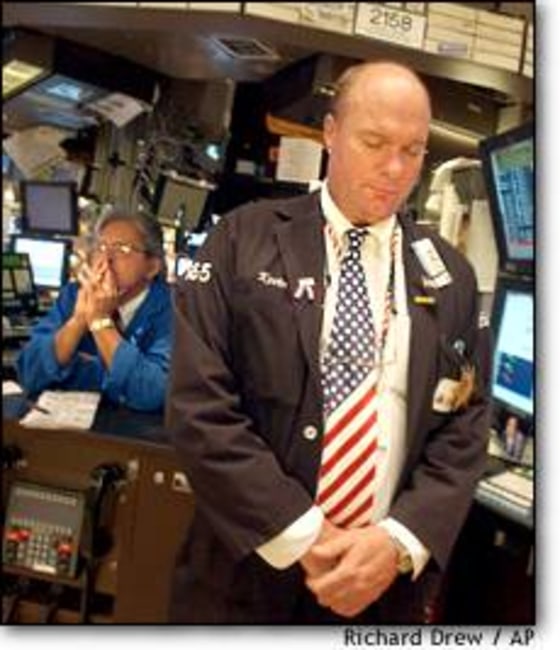Blue chips rose Monday, erasing most of Friday’s losses, as hopes for no action on interest rates from the U.S. Federal Reserve offset the dollar’s slide to a new low against the euro.
U.S. stock futures pointed to a negative start for Wall Street before Monday’s open, as traders focused on the dollar’s latest losses, given the absence of any major market-moving economic or earnings news.
The greenback hit a record low against the euro for the seventh straight session Monday after a disappointing U.S. jobs report on Friday, which dented the major indexes. The report showed surprisingly soft jobs growth in November, contradicting analysts’ more bullish forecasts.
Still, the Dow Jones industrial average rose at Monday’s open and was up about 60 points in mid-afternoon trading. It closed Friday 68.14 points lower at 9,862.68. The broader market was mixed.
The Standard & Poor’s 500-stock index was lately higher by just under 3 points, while the Nasdaq Composite index, a broad measure of the technology sector, was down about 2 points, adding to Friday’s 1.6 percent decline.
“I think the market may have exaggerated its move to the downside on Friday and that’s why we are seeing a technical bounce today,” said Peter Cardillo, chief strategist at Global Partners Securities. “The market is realizing that employment is growing and not shrinking, so I think Friday’s sell-off was overdone.”
Traders also said the market was higher in anticipation of a decision not to take any action on interest rates from the Federal Reserve at its meeting on Tuesday, which was offsetting concerns over the dollar’s continued slide.
Aside from the Fed meeting, this week is expected to be a fairly quiet one for Wall Street.
With stocks up sharply from a five-year low hit in mid-March, many portfolio managers and traders are nervously waiting out the year, hoping to hold on to the gains they have made. The S&P 500 index, a broad measure of the overall market, is up over 20 percent so far this year.
Syron named Freddie Mac chief
In company news, mortgage company Freddie Mac said it has named business executive Richard F. Syron as its new chairman and chief executive. Syron, who succeeds Gregory Parseghian who was ousted in August after being implicated in accounting misdeeds at the firm, is a former head of the American Stock Exchange.
Dow 30 component and retail colossus Wal-Mart Stores said Monday it expects to meet its forecast for a 3-to-5 percent increase in December sales at stores open at least a year. In an update covering sales through Dec. 5, before the winter snow storm in the U.S. Northeast, Wal-Mart said office supplies, toys, infant merchandise and household paper were among the best-selling categories.
McDonald’s, another Dow member and the world’s largest fast-food company reported a 6.4 percent increase in November sales at restaurants open more than a year, helped by improvements in its primary U.S. market, such as meal-sized salads and a Monopoly game promotion.
Also, Emirates airlines announced a $1.5 billion deal with U.S. engine manufacturers General Electric and Pratt & Whitney for more than 100 engines to power an order of Airbus A380 aircraft.
Wall Street waits for Fed
The wording of an official statement from the Federal Reserve will likely determine the direction of stock prices early this week, as traders wait to hear if the central bank will alter its pledge to keep monetary policy accommodative for a “considerable period.”
The Fed’s policy-setting Federal Open Market Committee gathers on Tuesday and the meeting is expected to be the highlight of the week on Wall Street.
Most market strategists reckon Fed policy-makers will likely opt to leave the key federal funds rate — the interest rate banks pay each other for overnight loans — unchanged at a 45-year low of 1 percent. But there has been much debate on Wall Street over the wording of the statement that usually accompanies the central bank’s rate decisions.
Mounting evidence of a strengthening U.S. economy has led some to speculate the Fed might decide to modify its language, changing or eliminating a commitment made in the August statement to keep monetary policy accommodative for a “considerable period.”
Later in the week, investors will have a few more economic reports to chew on, including November retail sales data, November U.S. producer prices and the University of Michigan’s preliminary report on U.S. consumer sentiment in the month of December.
“Thursday’s weekly jobless claims data might be important too, given the disappointing November payrolls data, and so will any data about the holiday shopping season,” noted Steve Stanley, an economist RBS Greenwich Capital.
European and Asian markets slid, with Japan’s benchmark Nikkei average losing more than 3 percent.
The dollar was weaker, trading at 1.2213 dollars to the euro and 107.20 yen to the dollar, compared with 1.2167 dollars and 107.70 yen late Friday in New York.
